Anya and I both didn’t sleep very well. Perhaps we were too close to the automatic door opening noise in the evening. Perhaps it was the first night in a new bed with only one pillow. Perhaps the blinds and drapes weren’t opaque enough for the 4:35 am sunrise. Perhaps there was lots on my mind. Perhaps all of the above. Regardless, the day went very well here at Johannelunds teologiska högskola.
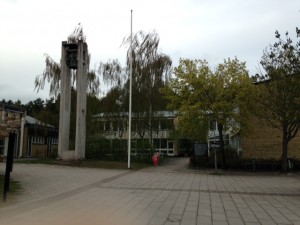
After a tour of the campus, I joined the community for the chapel with communion service and then tea with the faculty (of course, most drank coffee). Then my presentation about my PhD research was shared. The Swedish Evangelical Mission has had a long relationship with Tanzania. One of the faculty taught at one of the seminaries in the south for 10 years. He had great Kiswahili. Just on the way to lunch, I met the current director of the Swedish Evangelical Mission who had also worked in Tanzania. As we leave tomorrow, I’ll miss the student presentation of their trip to Tanzania recently. I’m among friends!
After some lunch and conversations, our host took us around Uppsala, with an amazing church and scientific history. The tallest cathedral in Scandinavia is here (most of the structure was built between 1272 and 1420).
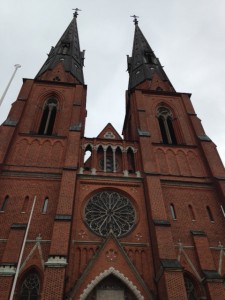
There are some important people interred here, including Gustav I, born Gustav Eriksson and later known as Gustav Vasa (1496 – 1560), was King of Sweden from 1523 until his 1560 death. His sarcophagus has two of his three wives with him (looking like he has two wives in bed!).
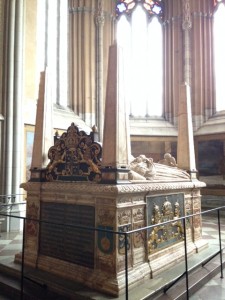
But my favorite as a biology major who studies botany is Carl Linnaeus (1707 – 1778), also known after his ennoblement as Carl von Linné. Linnaeus was a botanist, physician, and zoologist, who laid the foundations for the modern biological naming scheme of binomial nomenclature. He is known as the father of modern taxonomy, and is also considered one of the fathers of modern ecology. (Wikipedia)
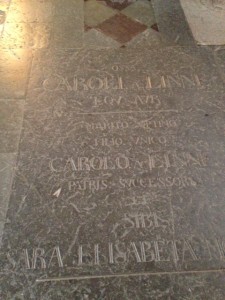
We walked past the University of Uppsala, which had other famous people besides Linneaus:
- Nathan Söderblom (1866–1931) awarded the Nobel Peace Prize in 1930
- Anders Celsius (1701–1744), physicist, astronomer and inventor of the Celsius scale
- Anders Jonas Ångström (1814 – 1874) a physicist and one of the founders of the science of spectroscopy; the Ångström unit (1 Å = 10−10 m) in which the wavelengths of light and interatomic spacings in condensed matter are sometimes measured are named after him
- Niklas Zennström (1966- ) co-founder of KaZaA and Skype is also a former student at Uppsala University
- And several other Nobel laureates in the sciences and literature as well.
As we walked, we had to be careful not to walk on the bike path. There are bikes everywhere! It is quite flat all about, except a modest hill up to the main university library and a “silly castle”.
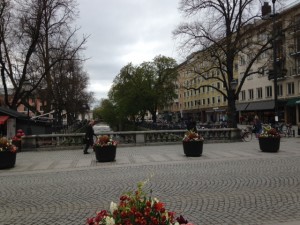
A special feature of the library (which we didn’t see) is The Codex Argenteus, “Silver Book”, is a 6th-century manuscript, originally containing bishop Ulfilas’s 4th century translation of the Bible into the Gothic language. (Wikipedia) This is one of the oldest Gothic language sources, translated by one of the first Bible translators, Ulfila (who was considered somewhat of a heretic due to his Arian views).
Another old inscription (one of several) was a rune stone by the university. Though it seems older than a manuscript, it is actually from the 13th century. The manuscript is twice as old!
Our host treated us to tea/soda and pastries, and then agreed to leave us in the shopping area of the city (Oh, this is the 4th largest city of Sweden with just under 150,000 people.) Anya was glad to have some time walking around and checking things out. We only bought a notebook and some food, including a yogurt smoothie.
We ended up walking the 1.8 miles back to campus along walking paths, staying on the right to not get run over by bikes on the other half of the paved path.
We return to Sandnes tomorrow.
With blessings,
Beth
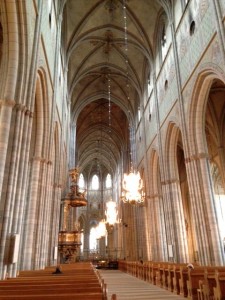
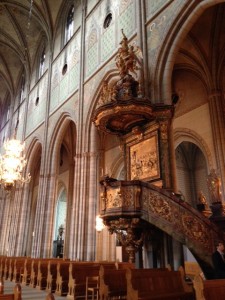
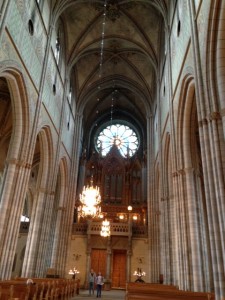
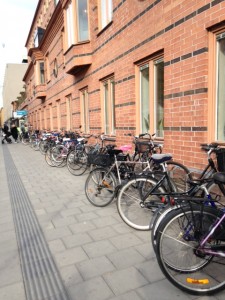
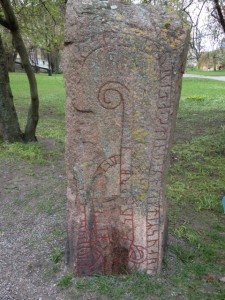

Beth–
Thanks so much for this colorful sharing of your and Anya’s journey to Sweden. We are especially glad that things went so well with your presentation of your doctoral research project.
–Charlie & Pam